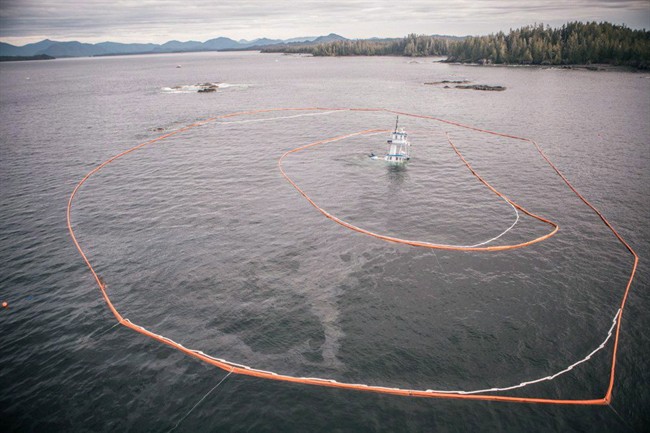The federal government has announced new details of how its $1.5-billion Oceans Protection Plan (OPP) will be applied to B.C.’s coast.

In a speech to the British Columbia Chamber of Shipping’s Annual General Meeting, Transport Minister Marc Garneau unveiled a new $1.2 million contract with North Vancouver-based Aqua-Guard Spill Response Inc. to buy new spill response equipment.
The company will provide multi-cassette portable skimmer packages, which are used by the Canadian Coast Guard to recover marine pollution spills.
Garneu also announced a pilot project with the Haida and Gita’at First Nations to develop and test a new “enhanced maritime situational awareness” on the province’s North Coast.
WATCH: Prime Minister announces $1.5B ocean protection plan in Vancouver

The pilots, which will run for a year beginning in fall 2018, will “provide coastal partners, including Indigenous peoples, provincial governments, scientific non-governmental organizations and other stakeholders, with essential maritime information, including near real-time data on ship traffic,” according to a government media release.
Garneu’s speech also highlighted $167 million the government has earmarked from its 2018 budget to study maritime risks to cetacean populations, including B.C.’s endangered Southern Resident orca population. According to the non-profit Orca Network, that population sat at just 76 as of September 2017. Garneau said the money would allow researchers to develop and test new regulatory measures to reduce underwater noise from vessels.
Coastal spill response

Get daily National news
The federal government first announced the Oceans Protection Plan, which will dedicate $1.5 billion nationally over five years, in November 2016, in the run up to the federal approval of the Kinder Morgan Trans Mountain pipeline expansion.
The initiative is of heightened interest in British Columbia, where the now-approved pipeline project would deliver a seven-fold increase in tanker traffic and where environmental opposition has focused heavily on the threat of a marine spill.
Spill management on the province’s coast has also come under increased scrutiny in the wake of widely criticized responses to the 2015 Marathassa spill in English Bay and 2016 Nathan E Stewart spill near Bella Bella.
WATCH: First Nation releases report on Nathan E. Stewart oil spill

When former B.C. Premier Christy Clark granted the pipeline expansion provincial approval in January 2017, one of her five conditions for giving the green light was “world-leading marine oil spill response, prevention and recovery systems” for the province’s coastline.
Ottawa says it has already committed $500 million to projects through the OPP, though much of that will also flow to initiatives in the Arctic and the Maritime provinces.
However, Ottawa has made several key commitments under the OPP related to B.C. spill response.
- B.C. First Nation opposes cull on its territory after footage of ‘Judas’ wolf
- Father of Tumbler Ridge school shooter issues statement: ‘I carry a sorrow’
- Tumbler Ridge school shooting suspect was ‘hunting,’ RCMP says
- ‘We now have to figure out how to live life without her’: Mother of Tumbler Ridge shooting victim speaks
In December, the federal government announced $80 million for research into the prevention and effects of oil spills in the marine environment, and in 2017 implemented a moratorium on large oil tanker traffic on B.C.’s North Coast.
Last year, the Department of Fisheries and Oceans committed to opening four new Canadian Coast Guard lifeboat stations on the B.C. coast, along with six new radar stations. It also pledged to develop 24/7 emergency management and response capacity in the Victoria Regional Operations Centre, and $75 million has been earmarked nationally for a coastal restoration fund.
A further $50 million has been earmarked nationally to study the effects of human activities on marine ecosystems, including the ports of Vancouver and Prince Rupert, through a Coastal Environmental Baseline Program.
The plan further calls for the environment ministry to develop 24/7 oil spill monitoring, improve its marine weather services in high risk areas, and to hire two new enforcement officers and a wildlife biologist for emergency response in the Pacific region, though it is unclear how much money has been earmarked for these projects.












Comments
Want to discuss? Please read our Commenting Policy first.